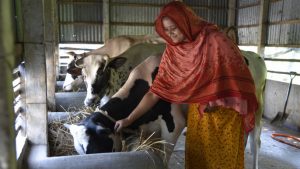Speaking at a Rural Press Club of Victoria webinar last week Mr Littleproud went on the offensive, saying the big two supermarkets were the ‘perpetrators of misery’ within the dairy industry and that they had to engage with the sector to help restore more sustainable returns to dairy farmers.
“The supermarkets do have a role to play in this and what I did was have a conversation with them as I did about 12 months ago in asking them to break a dollar a litre milk, which devalued the industry,” Mr Littleproud said.
He went on to slam their initial response to the problem in adding a 10 cents a litre levy to their $1 a litre products, a move widely panned by dairy farmers as insufficient.
“The disappointing thing is that effectively, the supermarkets have tried to put tokenistic gimmicks out there to try and fool metropolitan Australians that they’re all caring, they’re all loving of dairy farmers, when in fact they have devalued the industry and they don’t want to be part of the solution.”
Mr Littleproud said he would put the voluntary Grocery Code of Conduct under the microscope to ensure the supermarkets acted fairly.
“I’ve got some questions about it being voluntary because when it’s voluntary there’s no stick, if they step out of line, what does the stick look?” he questioned.
And he said this query extended beyond just the dairy industry.
“It’s not just dairy, this is the problem I also I have around supermarkets.
“Dairy is not isolated in its treatment, there have been other industries where the supermarkets have not behaved the way that you would think an Australian would behave,” he said.
While acknowledging there were still problems to work through in terms of dairy pricing even with the introduction of the mandatory code of conduct, Mr Littleproud ruled out a government-regulated pricing system.
“You only have to look at barley. If governments regulate or are seen to regulate a price of any commodity, then our trading partners will do exactly what they’ve done on barley.
“They will say that the government has interfered and that we are not living up to the terms and conditions of our trade agreements.” “Once you start interfering, you then leave yourself open for an exporting partner to do exactly what they’ve just done now, is that they will go and put a tariff on that commodity.”
Mr Littleproud said he was working with dairy groups to continue to improve the dairy code.
“We understand that there are different markets, and we don’t want to have an unintended consequence of a regulatory reform that would impact one of those markets against the other, so we’ve got to make sure we understand the concerns.”
Mr Littleproud said he felt a missing piece of the puzzle was the link from supermarkets back to the processor.
“I think there’s, there’s got to be a link from the supermarket back through the processor to the farm gate at the moment the code is really just from the farm gate to the processor.”













